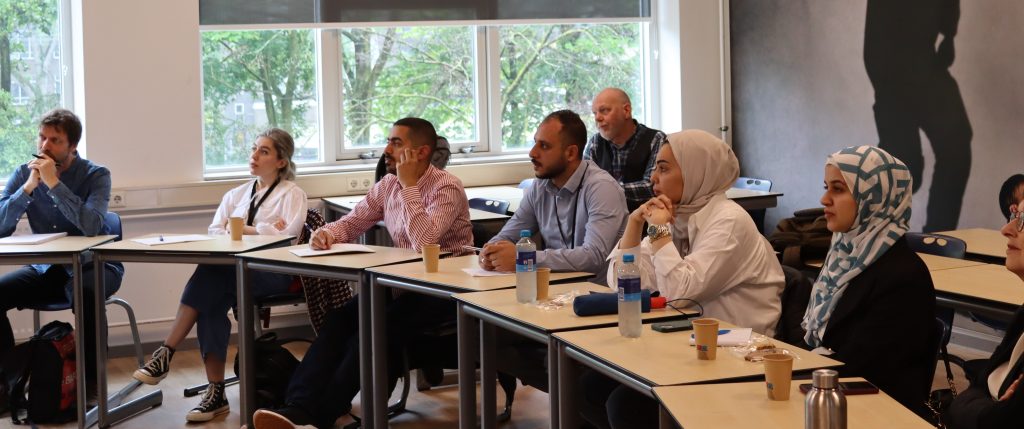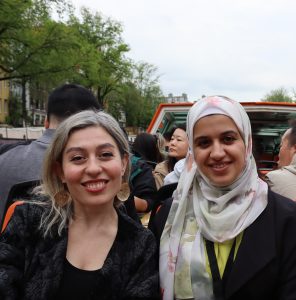Since the COVID-19 pandemic, digital learning has emerged as a valuable tool worldwide. Despite its benefits, schools face challenges in effectively using technology to engage students and teach essential skills. To address this need, The Hague Academy developed the training programme, The Fundamentals for Digital Learning. This training was completed as part of the Orange Knowledge Programme; a programme funded by the Dutch Ministry of Foreign Affairs and managed by Nuffic.
Following a week of in-person training in Jordan and three online workshops, selected teachers were invited to the Netherlands to exchange ideas with Dutch practitioners. Among them were two instructors at Luminus Technical University College in Amman, Jordan, a Technical and Vocational Education and Training (TVET) institution focused on enhancing students’ employability skills.

Spotlight on Educators
Jumana, with a background in computer information systems, specializes in cybersecurity instruction and training fellow educators. Natali, an English language instructor with a Master’s in diplomatic studies, teaches with a focus on critical skills for the modern workplace. They joined The Fundamentals for Digital Learning course to gain practical and theoretical insights relevant to digital education, with the goal of implementing this knowledge in their work back in Jordan. Jumana shared that Luminus Technical University College constantly seeks to enhance technological skills, making this training an ideal opportunity for her and Natali to gain expertise in digital learning, which they plan to share with their colleagues.
“This training, which started in March, has been very rewarding. We gained practical, theoretical, and digital knowledge that we can apply in our country’s educational system. We feel privileged to have been part of this training.”
Takeaways and Next Steps for Digital Learning
When asked about the training, Jumana emphasized that it is a comprehensive programme, covering essential topics for instructors, from content management to student engagement strategies. Natali noted that learning extended beyond the classroom to include study visits, such as the one to Albeda College in Rotterdam. There, they observed student-teacher interaction and learned innovative evaluation methods. One takeaway was the use of rubrics for assessment rather than traditional grading, which they believe will encourage student engagement. Another source of inspiration for Jumana and Natali was a website developed by a professor which gave suggestions for learning activities based on students’ needs. Both look forward to implementing several techniques learned during the course, such as mind mapping for lesson planning and goal setting, new teaching and grading approaches, and stakeholder management skills.
Reflecting on the programme, Natali highly recommends this training to other professionals for its blend of practical, theoretical, and digital knowledge that is immediately applicable in education. For Jumana, the training provided valuable insights into becoming an effective instructor. By taking on the role of a student, she gained a better understanding of methods to engage learners and manage different classroom scenarios effectively.
Advancing Teaching in the Digital Era
Jumana and Natali’s experience in The Hague Academy’s The Fundamentals for Digital Learning programme highlights the vital role of digital learning in today’s educational landscape. With practical and theoretical expertise, they are now better equipped to implement innovative teaching methods at Luminus Technical University College. This training not only enriched their instructional skills but also provided insights that other educators can use to engage students effectively with digital tools. Overall, this training initiative under the umbrella of the Nuffic Orange Knowledge Programme, funded by the Dutch Ministry of Foreign Affairs, highlights the critical role of continuous education and global collaboration in advancing teaching practices in today’s digital era.
